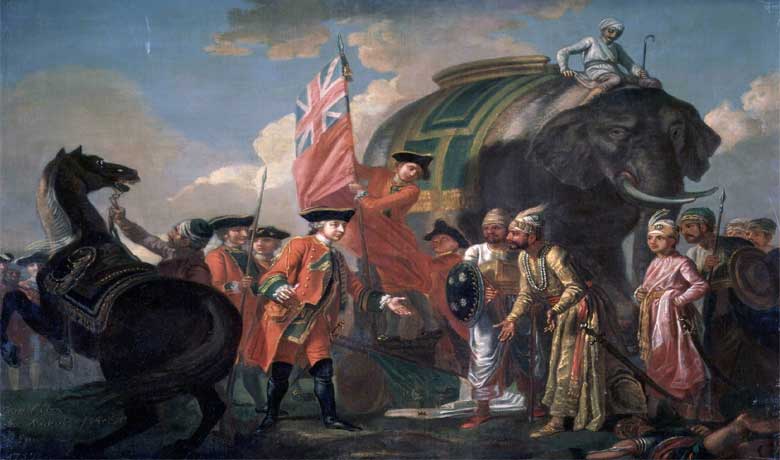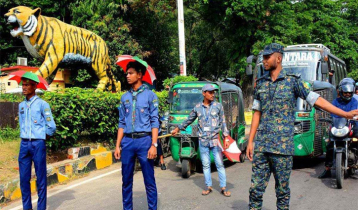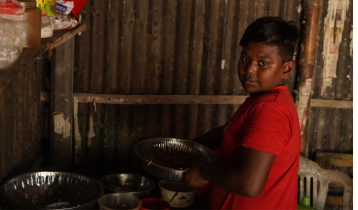Polashi Juddho: A battle that snatched away independence
Aminul || risingbd.com

Lord Clive meeting with Mir Jafar after the Battle of Plassey, oil on canvas (Francis Hayman, c. 1762)
Aminul Islam: Almost exactly 258 years ago, on June 23, 1757, a battle was fought in the mango groves of Palashi (Anglicized version: Plassey) on the banks of the Bhagirathi River, about 150 km north of Calcutta and south of Murshidabad, then capital of Bengal-- now in Nadia district of the Indian state of West Bengal.
The Battle of Plassey (Polashi Juddho) was a decisive victory of the British East India Company over the Nawab of Bengal and his French allies. The battle established the Company rule in Bengal which expanded over much of India for the next hundred years.
The battle took place between the nawab of "Sube Bangla," which was the province of Bengal comprising Bengal, Bihar and Orrissa, and the East India Company -- a trading house from Great Britain.
At the end of the battle, the East India Company came out as the victor. The Battle of Palashi, which took away our independence, was one of the pivotal battles which led to the formation of the British Empire in India.
The belligerents were Nawab Siraj-ud-daulah, the last independent Nawab of Bengal, and the British East India Company. When Alivardhi Khan died in 1756, Siraj-ud-daulah became the nawab of Bengal. He ordered the English to stop the extension of their fortification.
Robert Clive bribed Mir Jafar, the commander in chief of the nawab`s army, and also promised him to make him Nawab of Bengal and attacked Calcutta. He defeated the Nawab at Plassey in 1757 and captured Calcutta.
The battle was preceded by the attack on British-controlled Calcutta by Nawab Siraj-ud-daulah and the Black Hole incident. The British sent reinforcements under Colonel Robert Clive and Admiral Charles Watson from Madras to Bengal and recaptured Calcutta.
Clive then seized the initiative to capture the French fort of Chandernagar. Tensions and suspicions between Siraj-ud-daulah and the British culminated in the Battle of Plassey. The battle was waged during the Seven Years` War (1756–63), and, in a mirror of their European rivalry, the French East India Company (La Compagnie des Indes Orientales) sent a small contingent to fight against the British.
Siraj-ud-Daulah had a numerically superior force and made his stand at Plassey. The British, worried about being outnumbered, formed a conspiracy with Siraj-ud-Daulah`s demoted army chief Mir Jafar, along with others such as Yar Lutuf Khan, Jagat Seths, Mahtab Chand, Swarup Chand, Omichund and Rai Durlabh.
Mir Jafar, Rai Durlabh and Yar Lutuf Khan thus assembled their troops near the battlefield but made no move to actually join the battle. Siraj-ud-Daulah`s army with 18,000 soldiers was defeated by 3,00 soldiers of Col. Robert Clive, owing to the flight of Siraj-ud-daulah from the battlefield and the inactivity of the conspirators.
The battle was ended in 40 minutes. And took all 18,000 soldiers to Fort William in Kolkata. He killed all soldiers with the help of Mir Jafar. Later They also killed Siraj-ud-daulah in Murshidabad which was the capital of Bengal.
This is judged to be one of the pivotal battles in the control of Indian subcontinent by the colonial powers. The British now wielded enormous influence over the Nawab and consequently acquired large amounts of concession for previous losses and revenue from trade.
The British further used this revenue to increase their military might and push the other European colonial powers such as the Dutch and the French out of South Asia, thus expanding the British Empire in Asia.
The battle lasted for about only eight hours where the Nawab was defeated by the company due to treachery of his foremost general Mir Jafar. Mir Jafar was aspiring to the throne, his local associates wanted more income, power and privileges, and the East India Company was ready to take unlimited concessions of lucrative trade in Bengal.
risingbd/DHAKA/June 23, 2015/Aminul
risingbd.com























